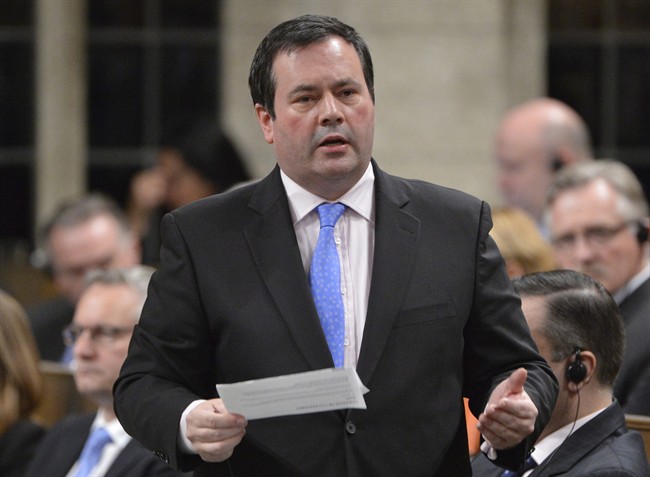OTTAWA – The battle between Ottawa and the provinces and territories over a contentious federal jobs training proposal appears far from over.

The provinces are glad the federal Conservatives are offering more flexibility on how the Canada Job Grant would be funded, but there’s no agreement yet, Manitoba’s jobs minister said Friday after a conference call with her counterparts.
“The provinces are united in their commitment to working together with the federal government,” Theresa Oswald said in a statement.
“We have seen some flexibility … which is encouraging but there is still work to be done.”
Oswald said she wants a plan that ensures all unemployed Manitobans are able to access programs that will give them the skills they need to get a good job – a sentiment echoed by her more combative Ontario counterpart.
Ottawa’s plan to drain hundreds of millions of dollars from provincial and territorial job training programs to help fund the grant is still a sticking point, Ontario’s training minister Brad Duguid said ahead of the ministers’ call.
He wouldn’t say if it was non-negotiable, or if Ontario was prepared to walk away if the federal government refuses to bend on the issue. But he suggested there is room for the Tories to sweeten their latest offer.
Duguid said the provinces need to make it clear to Ottawa that “there’s still a long way to go, but that we hope that they can continue to address these ongoing challenges.”
- Michael Kovrig reflects on ‘brutally hard’ Chinese detention: ‘You’re totally alone’
- TD Bank moves to seize home of Russian-Canadian jailed for smuggling tech to Kremlin
- U.S. moves to ban Chinese software, hardware from all vehicles in America
- Conservatives set to table non-confidence motion Tuesday. What to expect
Allen Roach, the Prince Edward Island minister who is co-chairing a group provincial ministers responsible for the labour market, sent a letter to federal minister Jason Kenney, saying the provinces continue to have “fundamental concerns.”

Get weekly money news
“Ministers are united in their concerns and expressed disappointment that you continue to propose to fund the Canada Job Grant through substantial cuts to (existing labour market) programs,” Roach’s letter states.
“These programs serve our most vulnerable Canadians and have demonstrated positive results.”
The proposed Canada Job Grant is supposed to provide $15,000 to each eligible worker, with the cost divided equally among Ottawa, the provinces and employers.
But the provinces have resisted, saying it would divert millions of federal dollars from programs the provinces already run, while asking them to pony up another $300 million to match funds for the grant.
Kenney, who is responsible for reaching a deal with the provinces, recently offered to cover the provincial portion of the proposed grants, raising their contribution to $10,000.
“The provinces have been offered the flexibility to cover a significant portion of the funds for the Canada Job Grant from the Labour Market Development Agreement,” which provides funds to help the EI-eligible unemployed, said a federal government official, speaking on condition of anonymity.
Duguid said while Kenney’s counter-offer covers the additional $300 million that the provinces would have to find, it would still take $300 million in federal money out of existing provincially run programs for youth, aboriginals and disabled people – workers the Tories have promised to help.
“Proposing a $300-million cut across the country — and in Ontario, $116 million cut — to programs that serve our most vulnerable workers without replacing that funding in any way of those programs is a funny way of showing concern for vulnerable workers and marginalized groups,” he said in an interview.
“That’s our major sticking point.”
The money comes through the Labour Market Agreements, which are meant to help the unemployed who don’t qualify for employment insurance, as well as low-skilled or poorly educated workers who do have jobs.
But the federal Tories say they do provide other money to help youth, aboriginal and older workers, as well as $2.2 billion a year through two other labour agreements — including the Labour Market Development Agreement — that help workers who are eligible for EI and people with disabilities.
Although the Tories are offering to increase their contribution to the Canada Job Grant, they’re not offering any additional funds. Some groups say that will cut the number of grants and reduce the program’s impact.
“What it means is that there’s less money to provide to individual employers, but there would be fewer employers that would benefit from the grant, and that would be unfortunate,” said Jayson Myers, president and CEO of Canadian Manufacturers and Exporters.
The federal and provincial governments should be working together to address the lack of skilled workers and find out which training programs are working, he said.
“The issue around training and skills development is much broader than simply the issue around the jobs grant,” Myers said.
“And I would hope that the provinces and the federal government would be able to speak about or able to discuss a wide variety of issues … what has to be done in terms of changing the way we do training, as well as the funding part of it.”
The Tories touted the plan in last October’s throne speech and have spent millions of dollars advertising it, all without the agreement of the provinces and territories. Kenney’s first sit-down with his counterparts was in early November.
Kenney has said he’s cautiously optimistic an agreement can be reached before the plan is scheduled to go into effect April 1.
a Kenney counterproposal.





Comments